Fund/Build/Scale
After working for years in early-stage startups and as a journalist, here are three hard truths I’ve learned: 1. Success in Silicon Valley hinges on connections, hard work and luck. 2. Startups often fail because founders lack fundamental business knowledge. 3. Real, actionable advice comes from those who’ve actually done it. There’s no such thing as “founder DNA.” If you’re willing to take on risk and invest years of your life in something that has maybe a 10% chance of paying off — less if you’re a woman or person of color — you can be a startup founder. Here’s why I founded Fund/Build/Scale: 1. To help founders make fewer mistakes. 2. To share successful strategies that can accelerate your go-to-market journey. 3. To inspire more people to see themselves as potential founders. There’s a lot of overlooked talent out there, and we are missing out. This podcast is for anyone who’s interested in learning the basic skills required to launch a startup, secure initial funding and transform an idea into a sustainable business. I’m talking to guests about everything: finding a co-founder, conducting customer discovery, recruiting early employees, developing a PLG strategy, fundraising when you’re outside a major tech hub — all of it. Interested? Subscribe to Fund/Build/Scale on all major platforms and follow the podcast on LinkedIn to get articles, excerpts, transcripts and more. Fund/Build/Scale is a production of Truth and Soul Media LLC.
Episodes

Tuesday Aug 12, 2025
Tuesday Aug 12, 2025
When you’re raising your first rounds, every cap table decision can echo for years. Give away too much equity early, lock yourself into restrictive pro rata rights, or over-optimize for valuation — and you may find yourself boxed in just when your company starts to grow.
Pulley co-founder and CEO Yin Wu has seen these mistakes firsthand. In this episode of Fund/Build/Scale, she offers practical, founder-first strategies for structuring and managing your cap table so you can attract top talent, keep your options open, and stay in control of your startup’s destiny.
We also discuss how to compete with entrenched incumbents, why her LinkedIn profile says she works in Customer Success, and how founders can shift their role as the company scales.
RUNTIME 38:44
EPISODE BREAKDOWN
(2:46) Why her LinkedIn profile says she’s in “customer success,” not CEO/co-founder.
(5:43) How much time passed between Day Zero and serving Pulley’s first customer?
(9:48) “ You're trying to market the product, and then you're also playing the role of customer success at the same time.”
(10:04) The number-one cap table mistake founders make? “Being too greedy.”
(13:55) Why are startups sticking with four-year vesting schedules when it takes 7-10 years to exit?
(15:14) How founders should think about pro rata rights in early rounds.
(19:04) Taking money out in a secondary “ actually releases some of the pressure and allows founders to focus.”
(21:04) Founder-preferred shares “are becoming increasingly popular.”
(24:15) CEO/founders need to remember “ the soft power that you have as a leader of the company.”
(26:45) How Yin defines “founder mode.”
(30:50) “ Every successful company has been a response to some incumbent’s worldview.”
(33:38) Why going public “ can actually make it tough for companies to be able to innovate.”
(34:04) The one question she’d ask the CEO if she were interviewing for a job with an early-stage startup.
LINKS
Yin Wu
Pulley
How to Scale a Startup in Just 3 Months, Pulley
Employee Equity, Sam Altman
Will the Blockbuster Deal for Wiz Spur an M&A Wave in Cybersecurity?, WSJ Pro VC
SUBSCRIBE
📥 Get the Fund/Build/Scale newsletter on LinkedIn.
https://www.linkedin.com/newsletters/7249143254363856897/
📸 Follow Fund/Build/Scale on Instagram.
https://www.instagram.com/fundbuildscale/
Thanks for listening!
– Walter.

Friday Aug 08, 2025
Friday Aug 08, 2025
A turbulent flight sparked Wayne Slavin’s idea for Sure: let consumers buy insurance in real time. But after launching as a D2C app, he realized the bigger opportunity was powering insurance sales for others. Sure’s pivot to B2B turned it into a vertical SaaS platform that lets enterprise companies embed insurance at the point of transaction.
In this episode, Wayne explains how to pivot without losing your mission, why founders should lead early enterprise sales, and why he refuses to run proof-of-concept deals. He also shares why — if he could do it over — he’d avoid launching a business with so much built-in complexity.
RUNTIME 51:58
EPISODE BREAKDOWN
(3:16) How a turbulent flight inspired Wayne to sell insurance directly to consumers.
(7:03) Why he reached out to a founder who tried (and failed) to launch an insuretech startup.
(12:01) Becoming fluent in insurance industry jargon “was definitely a learning curve.”
(16:05) The point when Wayne realized Sure needed to pivot.
(20:16) The transition from D2C to B2B “was a slow aircraft carrier style turn.”
(22:35) How to tell whether you’re grinding through a rough patch or building on the wrong model.
(29:21) When it was time to pitch to enterprise customers, “ most of those conversations were led by me.
(32:40) “ Proofs of concept are actually the way for a big company to not do something.”
(40:45) Sure is an embedded finance company, not an insurance company.
(44:04) “ In hindsight, I would not want to be in another business where you are dependent on two other parties performing.”
(49:08) The one question Wayne would have to ask the CEO if he were interviewing for a role with an early-stage startup.
LINKS
Wayne Slavin
Sure
"The Start-up From Hell," Inc.com
SUBSCRIBE
📥 LinkedIn: https://www.linkedin.com/newsletters/7249143254363856897/
📸 Instagram: https://www.instagram.com/fundbuildscale/
Thanks for listening!
– Walter.

Friday Aug 01, 2025
Friday Aug 01, 2025
James Joaquin is co-founder and managing partner at Obvious Ventures, a VC firm that backs startups tackling intractable problems like climate change, chronic disease, and income inequality.
Their portfolio includes businesses that once sounded like science fiction but are reshaping billion-dollar industries. He says he's looking for technology that will “move humanity forward."
But this episode isn’t just about mission-driven investing.
James gets extremely tactical: he breaks down how Obvious evaluates founding teams, how he prefers to be pitched, and how your answer to “why are you building this?” can make or break your shot at getting funded.
He also shares a framework for balancing ego with humility, why startups die of indigestion — not starvation — and how his experience building one of Apple’s most famous failures helped him identify category-defining companies.
By the end of this conversation, you’ll have a clearer understanding of what top-tier VCs are looking for—and whether your startup has what it takes to earn a “yes.”
RUNTIME 46:38
EPISODE BREAKDOWN
(2:37) James unpacks the firm’s origin story: “We love to say that all great ideas are obvious in hindsight.”
(7:43) What “world-positive” investing looks like in practice.
(10:41) When it comes to a founder’s domain expertise, “I don't think that there's one single archetype.”
(13:46) What's something you used to believe as a founder that changed dramatically after you became an investor?
(15:15) “A lot of the work that I do at Obvious is trying to sniff through the veneer and the BS to get to that authenticity.”
(18:13) The most successful founders he’s bet on “were weird, and they were ridiculed by whatever industry they were in at the start.”
(19:40) Tactical lessons he learned while working at Apple for six years after they acquired his startup.
(23:29) Why generative science has “ become a key investment thesis” for Obvious.
(26:48) James is looking for startups that will “ output or generate new scientific breakthroughs.”
(29:42) “ You almost cannot think too large in terms of the scale that we're going after.”
(33:03) James shares the framework Obvious used to evaluate geothermal startup Zanskar.
(37:58) The firm’s sweet spot: startups that are “just one step away from commercialization.”
(42:31) “ We don't get lost in the noise of what's going to happen in the next three and a half years.“
(43:54) What kind of startup would he launch today if he wanted to change the world?
LINKS
James Joaquin
Obvious Ventures
Biz Stone
Beyond
Diamond Foundry
Virta Health
Zanskar Geothermal & Minerals
Gusto
Xoom
What is a B Corp? (B Lab)
SUBSCRIBE
Get the newsletter
Follow Fund/Build/Scale on Instagram
Thanks for listening!
– Walter.
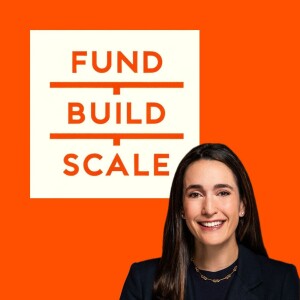
Monday Jun 23, 2025
Monday Jun 23, 2025
Uncork Capital Partner Amy Saper shares practical advice for early-stage founders building AI-enabled tools for engineering, product, and design teams, or as she describes them, "products that make you not want to quit your job."
Drawing on her experience in product marketing at Twitter, Uber, and Stripe, she explains why storytelling is an underrated founder skill, how to refine your ideal customer profile, and why it’s good to reverse-engineer a roadmap from your Series A goals.
She also shares tips for assessing founder/investor fit, when (and when not) to launch, and why she cares more about your conviction than your TAM slide.
If you're a technical founder looking to pitch smarter, launch better, and scale leaner, this episode is for you.
RUNTIME 40:46
EPISODE BREAKDOWN
(3:46) How Amy’s product marketing background informs her investor perspective
(8:45) Storytelling skill (and coachability) “ separates the mediocre founders from the exceptional ones.”
(12:02) “ I do tend to gravitate towards very technical teams. Sometimes they're all engineers.”
(15:16) A few questions Amy would ask a VC if she were an early-stage founder
(17:25) How she defines founder conviction — and the traits she looks for
(22:56) Identify your goals and targets, then work backwards from there
(26:55) “ I have a funny but also kind of real sub-thesis, which is products that make you not want to quit your job.”
(28:50) Thanks to new AI tools, “ we're seeing the rise of small lean teams that are achieving early profitability.”
(33:45) “ I am a sucker for a great deck or a beautiful presentation.”
(36:30) “ I care less about the overall TAM than how you're defining what's addressable.“
(39:27) The one question Amy would have to ask the CEO if she were interviewing for a job with an early-stage startup
LINKS
Amy Saper
Uncork Capital
SUBSCRIBE
📓 Get the Fund/Build/Scale newsletter on LinkedIn:
https://www.linkedin.com/newsletters/7249143254363856897/
📸 Follow Fund/Build/Scale on Instagram:
https://www.instagram.com/fundbuildscale/
Thanks for listening!
– Walter.
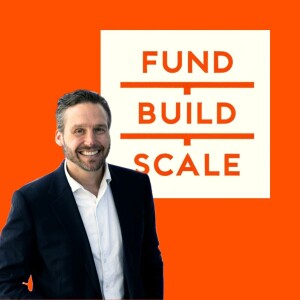
Sunday Jun 22, 2025
Sunday Jun 22, 2025
Ten Eleven Ventures CTO and Operating Partner Scott Lundgren shares practical advice for early-stage cybersecurity founders.
He explains why founder-market fit matters more than product polish, how teams should think about TAM in fragmented markets, and the signals he looks for in technical pitches.
He also breaks down how Ten Eleven’s network helps with diligence and customer development — and why “cool tech” often misses the mark. Plus: his take on the AI hype cycle, and why building credibility starts with listening, not pitching.
RUNTIME 38:06
EPISODE BREAKDOWN
(3:37) How founding an ISP as a teenager led Scott to a career in tech.
(6:06) Why he decided to join Ten Eleven Ventures as CTO/operating partner.
(9:53) Scott breaks down the essential elements of a cybersecurity pitch.
(14:31) Inexperienced founders, “as a general rule, have no idea about the TAM.”
(17:21) On AI hype: “ I'd like to see some more rigor with how we feel like we can start to quantify some of the benefits.”
(20:20) Having a global network of security professionals is “ a really great resource for us as a firm, but also for our founders.”
(21:51) Lessons learned from being on Carbon Black’s founding team.
(23:59) “ You need both of these things that are intertwined: the luck, and the the hard work.”
(26:08) Do customer discovery face-to-face, not over Zoom. “It isn't always productive, but there's no substitute for it.”
(30:57) Developing and promoting a startup mindset outside of Silicon Valley.
(35:30) “ If you build really cool tech to solve a pretty simple problem, then that probably was over-engineered.”
(36:11) How to build investor and future customer relationships — when you still have a job.
LINKS
Scott Lundgren
Ten Eleven Ventures
Carbon Black
SUBSCRIBE
📥 Get the Fund/Build/Scale newsletter on LinkedIn: https://www.linkedin.com/newsletters/7249143254363856897/
📸 Follow Fund/Build/Scale on Instagram:
https://www.instagram.com/fundbuildscale/
Thanks for listening!
– Walter.
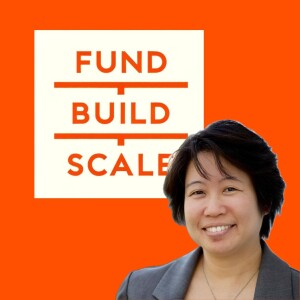
Thursday Jun 19, 2025
Thursday Jun 19, 2025
Construction workers spend hours on their hands and knees snapping chalk lines to mark where walls, plumbing and utilities should go. It’s painstaking, back-breaking labor. And that’s how it’s been done for centuries.
Tessa Lau saw an opportunity — and built a robot that does it faster, safer, and with surgical precision.
In this episode of Fund/Build/Scale, the Dusty Robotics founder and CEO shares some of what she's learned about transitioning from a researcher to a deep tech founder, including:
How she turned past startup mistakes into a rigorous customer discovery process
The structured approach Dusty used to land its first paying customer
Why she says stealth mode is overrated — and how building in public gave them a head start
How “cool tech” can lead you astray if you’re not solving a real problem
Smart ways to pivot and iterate based on actual user feedback
What it takes to build a mission-driven team that scales with you
If you’re interested in robotics, deep tech, or why some concepts fall into the valley of death while others sail over it like a Red Bull stunt team — listen in.
RUNTIME 43:10
EPISODE BREAKDOWN
(3:00) “ I always thought I would be a professor someday, and that was my planned career path.”
(5:39) How a home renovation project led Tessa into making construction robots
(9:16) “ We thought we were going to build a vacuum cleaning robot.”
(12:24) “You have to establish that someone is willing to pay for the technology and that it's doable.”
(14:15) “ We needed to build something that was 10x better than the status quo in order to scale at venture speed.”
(15:41) Finding a deep tech TAM is “ a hard problem, especially when you're creating a new category.”
(19:16) “ You can't try to be everything for everyone.”
(21:00) Their first prototype “could barely do anything,” but fast pilots helped them iterate quickly.
(26:08) How Tessa figured out their pricing *before* they went to market
(29:24) Why marketing and branding are table stakes for a deep-tech startup
(33:11) “ As the CEO, you are the face of the company whether you like it or not.”
(37:06) “ Our marketing team doesn't need to be very technically savvy.”
(38:22) “ I have yet to see a good reason to be in stealth, ever.”
(40:53) The one question she’d have to ask a deep tech CEO before accepting a job offer
LINKS
Tessa Lau
Dusty Robotics
Philipp Herget, CTO
IBM Research
Willow Garage, Wikipedia
“Savioke is now Relay Robotics,” 5/2/2022, The Robot Report
Crossing the Chasm, 3rd edition, Harper Books
SUBSCRIBE
📥 Get the Fund/Build/Scale newsletter on LinkedIn: https://www.linkedin.com/newsletters/7249143254363856897/
📸 Follow FBS on Instagram: https://www.instagram.com/fundbuildscale/
Thanks for listening!
– Walter.
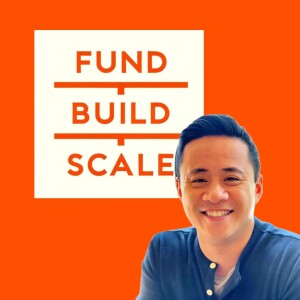
Friday Jun 13, 2025
Friday Jun 13, 2025
What happens when a team of legal veterans decides to rebuild the dispute resolution process from the ground up?
To find out, I interviewed Rich Lee, co-founder and CEO of New Era ADR, a platform designed to resolve legal disputes faster, at lower cost, and with less friction for both companies and individuals.
We talked about building a team that had enough credibility to sell into one of the most risk-averse industries, how they approached trust-building with both customers and investors, and how they're scaling a capital-efficient business in a category that’s been largely unchanged for decades.
Thanks for listening!
– Walter.
RUNTIME 39:46
EPISODE BREAKDOWN
(2:59) “ I'm an early adopter of, you know, anything.”
(10:03) “ The core problem: why does it cost so damn much to resolve a legal dispute in this country?”
(13:05) How Rich and his co-founders divided roles and responsibilities
(17:15) Hurdle #1: “ Challenging the underlying assumption that litigation and a legal dispute doesn't have to be two-plus years.”
(22:32) In the early days, New Era ADR developed multiple personas to overcome customer objections
(25:50) “ Fortunately, we didn't have to do a lot of POCs.”
(29:40) “ Our market's comically big.”
(30:03) Finding your SAM and SOM when the TAM is $350 billion
(32:22) Which came first: the pitch deck, or the revenue model?
(35:50) One question Rich would have to ask the CEO if he were interviewing for a role with an early-stage startup.
LINKS
Rich Lee
New Era ADR
The Future of ADR? New Era Bags $6.3m While Still at Seed Stage, Artificial Lawyer, 3/16/2022
SUBSCRIBE
📥 Get the Fund/Build/Scale newsletter on LinkedIn: https://www.linkedin.com/newsletters/7249143254363856897/
📸 Follow Fund/Build/Scale on Instagram: https://www.instagram.com/fundbuildscale/
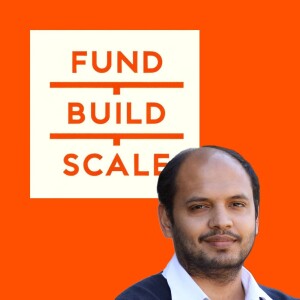
Monday Jun 09, 2025
Monday Jun 09, 2025
Before Postman became a category-defining platform used by millions of developers, it was a personal side project. In this episode, co-founder and CEO Abhinav Asthana shares how he went from hacking on API tools in Bangalore to leading a global company with nearly 900 employees across three continents.
We talk about:
Building a developer-first product that spread through word of mouth
Choosing a CEO when everyone on the founding team is an engineer
How to reach U.S. customers before you have a U.S. presence
Why authenticity beats thought leadership when you're building in public
Going from “ramen profitability” to Series A in just 17 months
Whether you're an engineer who’s thinking about starting something of your own, a founder operating outside of Silicon Valley, or just curious how Postman actually works, this episode is packed with tactical insights.
RUNTIME 49:19
EPISODE BREAKDOWN
(2:39) “ Being a developer who loved to hack and also design, I just decided to try my hand at this.”
(4:00) “ We had a hypothesis, but we didn't have a company.”
(6:08) Abhinav built goodwill with the developer community by being helpful
(9:26) How they settled on the name “Postman”
(11:51) On a team of engineers, how do you decide who should become CEO?
(15:00) Who was their first key hire outside of the founding team?
(20:15) Why he thinks early-stage startups should seek “ramen profitability”
(23:23) “ Our first marketing hire was about two years in.”
(25:18) What it was like to go from a seed round to Series A in just 17 months
(30:02) “ At that point, it kind of became clear that this is a new kind of category.”
(32:15) How Postman’s branding dovetails with the platform’s underlying technology
(36:13) One thing he would have done differently in the run-up to the Series A
(38:48) Managing cross-border growth when you’re based in Bangalore
(40:56) “ Building the company in two different places… it's just incredibly hard.”
(44:47) “ Don't skimp on two things ever in starting a venture-funded company: your lawyer, and your accountant.”
(45:52) One question he’d have to ask the CEO if he were interviewing for a job with an early-stage startup.
LINKS
Abhinav Asthana
Postman
Postman raises $50 million to deliver its API collaboration platform to more partners, 6/19/19, VentureBeat
SUBSCRIBE
📥 Get the Fund/Build/Scale newsletter on LinkedIn: https://www.linkedin.com/newsletters/7249143254363856897/
📸 Follow Fund/Build/Scale on Instagram: https://www.instagram.com/fundbuildscale/
Thanks for listening!
– Walter.
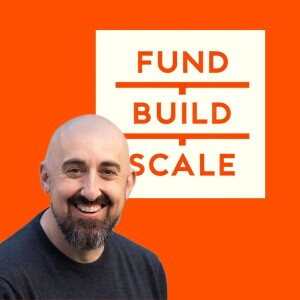
Friday May 30, 2025
Friday May 30, 2025
When Tony Stubblebine took over as CEO of Medium in 2022, the platform was burning $2.5 million a month, bleeding subscribers, and was overrun with content that left founder Evan Williams cringing.
Tony pitched Ev a turnaround built on small teams with access to data, customers, and the freedom to rebuild Medium like a startup from the inside out.
He wasn’t just another executive parachuting in — Tony had worked with him as head of engineering, later as a power user and publishing partner, and eventually, the person who convinced Ev that he could get things on track.
In this episode of Fund/Build/Scale, Tony explains how Medium became profitable for the first time, why the platform banned AI-generated content from its partner program, and how his long history as a user and advisor uniquely prepared him to lead the company through a delicate transformation.
RUNTIME 50:14
EPISODE BREAKDOWN
(3:41) “ I have a long track record of being associated with Medium for just strange reasons.”
(7:16) “ Maybe I'm crazy, but I thought on day one, ‘oh, this is a guaranteed win.’”
(9:52) “ I think CEOs are delusional, and some amount of delusion is probably healthy.”
(12:34) “ Precision is not possible without a combination of data science and user research or words.”
(14:30) Creating customer feedback loops in a 13-year-old company
(19:49) “ I would almost say there's no product to manage yet because we’re making it, and we’re making it together.”
(20:17) The two mandates Evan Williams gave Tony when he hired him as CEO
(24:23) “I knew even if we could grow subscribers, it would be on the back of this content that we weren't proud of.”
(25:45) Why Medium banned AI-generated content from its partner program: “ We're a pro-human product.”
(30:11) “ We love human moderation. We love our trust and safety team.”
(36:28) “ We're trying to be a place where a different set of writers will win on Medium than will win on these other platforms.”
(40:46) “ One hundred percent: Medium is for experience, not for influencers.”
(42:35) “ I really like to be a champion for what I would call ‘white hat content marketing.’”
(46:45) “ It's wild to me that the art of blogging has not been perfected this many decades into it.”
(48:17) “ It's impossible to understand how many niches there are.”
LINKS
Medium
Tony Stubblebine
Tony’s Medium profile
Mark Suster
Cal Newport
Flow: The Psychology of Optimal Experience, Mihaly Csikszentmihalyi
SUBSCRIBE
📥 Get the Fund/Build/Scale newsletter: https://www.linkedin.com/newsletters/7249143254363856897/
📸 Follow Fund/Build/Scale on Instagram: https://www.instagram.com/fundbuildscale/
Thanks for listening!
– Walter.
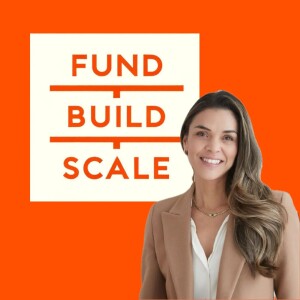
Tuesday May 27, 2025
Tuesday May 27, 2025
Rachel Springate is the founding general partner of Muse Capital, an early-stage venture fund focused on overlooked sectors like women’s health, wellness, parenting, gaming, and sustainability.
In this episode, she shares her strategy for finding value where other investors aren’t looking, explains how Muse assesses early traction in non-traditional markets, and breaks down the persistent funding gap facing women founders.
We also discuss:
How AI could transform women’s health
Why traditional VCs struggle to spot these opportunities
What needs to change to solve the “2% problem” in venture capital
Whether you're fundraising or building for an underserved market, this conversation offers tactical insights you can apply right now.
RUNTIME 49:49
EPISODE BREAKDOWN
(1:57) How Rachel connected with Muse Capital Founding Partner Assia Grazioli-Venier
(3:43) Why “care, live and play” are the sectors they’re most interested in
(8:04) “ Entrepreneurs struggle in this space because typically the people that are building are female or diverse — building for their own.”
(11:45) Many investors still don’t recognize that women’s health is a “ massive market opportunity.”
(14:52) What are some of the signals that tell her a founder is ready to work with investors?
(17:06) When it comes to domain expertise, “ our bar is pretty high.”
(19:47) Muse Capital’s process for analyzing market opportunities and evaluating founders
(24:26) How seed-stage founders should prepare for their first VC meeting(27:10) “When a founder comes in and says, ‘nobody's doing what we're doing,’ I'm like, ‘red flag.’”
(29:33) When it comes to women’s health, “ there's really interesting things that can be done with AI around unique data or proprietary data sets.”
(34:44) How is the current political environment impacting innovation/investment in women’s health?
(37:44) Why less than 2% of venture capital goes to startups led by women
(42:52) “ I do think we are going in the right direction. It's just gonna take a lot.”
(44:45) How to get more women into the VC pipeline
(47:45) If you could snap your fingers today and change one thing about VC, what would it be?
LINKS
Rachel Springate
Assia Grazioli-Venier
Muse Capital
SUBSCRIBE
📥 Subscribe to the Fund/Build/Scale newsletter
📸 Follow Fund/Build/Scale on Instagram
Thanks for listening!
– Walter.

How to take an AI startup from idea to reality
The first episode of Fund/Build/Scale will be available in February 2024.
For transcripts, show updates and other exclusive content, follow “Fund/Build/Scale” on:
- Substack: https://fundbuildscale.substack.com
- LinkedIn: https://www.linkedin.com/groups/14341226
- YouTube: https://youtube.com/@FBSpodcast
- Eventbrite: http://fundbuildscale.eventbrite.com







